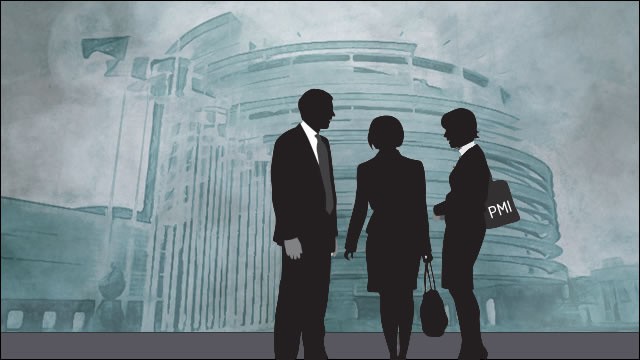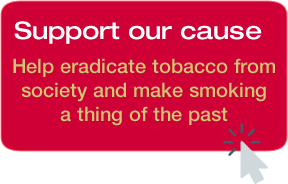Tobacco industry also pulling strings within the EU
16 April 2020

The introduction of neutral packaging for tobacco products in the Netherlands, which was scheduled to take place on 1 July 2020, has been delayed for at least three months. That is because the tobacco industry has manipulated three Eastern European countries for its own ends.
By Bas van Lier
Released in late 2018, the National Prevention Agreement in the Netherlands states that standard packaging for tobacco products is to be introduced in the country in 2020. All cigarettes and roll-your-own tobacco are to be packaged in an unattractive dark green-blue colour, and brand names will be printed in uniform lettering only. The necessary technical regulation was drafted and agreed in 2019, with 1 July 2020 chosen as the date of introduction.
In accordance with EU law, however, the EU must be notified of any such measure, and other member states have a right to comment. It is standard practice that the legal amendment is then suspended for three months. If member states do react with a so-called ‘detailed opinion’, then that period is automatically extended by three months. As a result, the whole legislation procedure is delayed.
Detailed opinion
Notification of the legal amendment with which the Netherlands plans to introduce the neutral packaging for tobacco products was submitted to the European Commission on 1 October 2019. On 20 December 2019, Slovakia responded with a ‘detailed opinion’, thereby automatically extending the standstill period of the legislative process until 2 April 2020. Later, on 13 March 2020, the Czech Republic also submitted a ‘detailed opinion’. Romania submitted a number of questions that have no effect on the standstill period.
The voice of the tobacco industry
As a result of the comments from Slovakia and the Czech Republic, the legislative process has been delayed by three months, and thus the introduction of neutral packaging has been put back until 1 October 2020, a spokesperson for State Secretary Blokhuis (Public Health) in the Netherlands has confirmed.
The salient point in all this that the delay has clearly been orchestrated by the tobacco industry. The TabakNee website, a website monitoring the tobacco lobby in the Netherlands, has made use of the European principles of open government to access the ‘detailed opinions’ and questions submitted by the Slovakian, Czech and Romanian governments. The arguments put forward are, word for word, the same dubious arguments that the tobacco industry has made time and again on the subject of neutral packaging. The website TobaccoTactics listed them all in a separate page.
‘Effectiveness unproven’
“Standard packaging has not been proven to be an effective tool for limiting smoking,” the Slovakian government begins its argument. “Although the Netherlands refers in the notification to the experience of other countries, it is easy to demonstrate that such claims are not supported by facts.”
That is followed by a summary of research intended to prove that the introduction of standard packaging in Australia, France and the United Kingdom had no effect. According to its own website, however, the Australian government takes a very different view. The United Kingdom, it is claimed, has also seen a rise in counterfeit cigarettes, “as standard packs are easier to falsify”.
‘Evaluate existing rules first’
In a later section, Slovakia refers to the ‘Better Regulation Principles’ of the Organisation for Economic Co-operation and Development (OECD). They state that existing legislation must first be evaluated before a country introduces new rules. The Dutch draft legislation has not done that, argues Slovakia, because a number of measures to discourage smoking have been implemented, and more measures are set to follow, such as a ban on displays and advertising at sales points in 2020 and a ban on tobacco vending machines from 2022. “It would be prudent to first evaluate the effectiveness of existing and approved future measures before introducing new measures.”
That is another argument we frequently hear from representatives of the tobacco industry, as recently illustrated during a radio series on NPO Radio 1 in which the tobacco industry was given ample airtime to make its case.
Slovakia has also contended that neutral packaging is in breach of European regulations on proportionality and the free movement of goods. That’s not a very valid argument if you consider that the United Kingdom, France, Ireland and Hungary have already introduced neutral packaging, and that not only the Netherlands but also Slovenia are working on its introduction.
Infringement of intellectual property rights
A fifth point put forward by Slovakia is the infringement of the intellectual property rights of brands that are prevented from placing their logos and specific design elements on their own products. Neutral packaging “restrict the intellectual property rights guaranteed by EU law, constitute an illegal expropriation of trademarks (conflict with Article 1 of Protocol 1 to the European Convention on Human Rights and Article 17 of the EU Charter of Fundamental Rights). Both European and Dutch national legislation allow for the expropriation of intellectual property in the public interest (if it passes the proportionality and necessity test), but this should be accompanied by fair compensation. At the same time, the denial of the right to use trademarks restricts competition because it impairs consumer choice and does not allow companies to compete on the basis of brands.”
It makes you wonder why a country such as Slovakia, which has no tobacco production of any significance, is making such a fuss of the issue.
Illegal trade
Finally, the objections from Slovakia repeat one of the standard objections made by the tobacco industry: the illegal trade in tobacco and the loss of excise duty. In Australia, total tobacco consumption is said not to have dropped after the introduction of neutral packaging, but the import of illegal tobacco is said to have risen enormously. In 2017, the document argues, counterfeit tobacco products accounted for 15 percent of all tobacco consumption. Australia is said to have lost two billion Australian dollars in excise duty as a result.
In France the volume of counterfeit cigarettes is said to have tripled between 2017 and 2018, and counterfeit cigarettes have also increased in Great Britain, according to Slovakia. “Rising crime has an impact not only on national tax revenues, but also negatively affects the entire supply chain up to the retail level. This shows that standardised packaging is a problem for all stakeholders except criminal gangs.”
WTO judgement
The truth is that there has not been any substantial increase in trade in counterfeit cigarettes anywhere, as a complaints panel of the World Trade Organization (WTO) pointed out in February 2019. The panel was responding in a case brought by Cuba, the Dominican Republic, Honduras and Indonesia, four tobacco-exporting countries that had complained about the introduction of plain packaging in Australia. The four countries have no major interests in Australia, but their main aim was to delay and discourage the introduction of neutral packaging in other countries. Moreover, in all likelihood they received support from the tobacco industry. Indeed, as in the case of the Czech Republic, Slovakia and Romania, the tobacco industry managed to take advantage of these countries.
‘Obstructing internal market’
The objections of the Czech Republic are less extensive and concentrate on the obstruction of the European internal market and the free movement of goods within the EU owing to the introduction of neutral packaging in some member countries. Even so, the Czech Republic concludes its objection with a remark about the infringement of intellectual property rights of cigarette manufacturers. “Blanket restriction would send a strong negative signal on the degree of respect for this type of ownership, with appreciable impacts on the competitiveness and quality of the business environment,” argues the Czech Republic.
Romania: bigger print size
In its comments, Romania first refers to intellectual property and then continues with a number of attempts to amend the legislation. For example, it proposes to increase the size of the required lettering of brand names because sellers would otherwise have too much difficulty distinguishing brand names from one another. In addition, the draft legislation makes no reference to the use of the e-symbol for indicating the weight on packets of roll-your-own tobacco, from which it could be concluded that the e (which stands for ‘approximately’) should not be used. A final point questions whether the draft legislation allows for a sticker to be put on the cellophane on cigarette packets so that the product can be traced, which is now prescribed by the European directive.
Romania has therefore raised a number of technical issues concerning the enforceability of the law. But not without criticising en passant the infringement of trademark rights and attempting to have the trademark names printed in larger lettering on the packets.
Infringement of Article 5.3
It is obvious that the tobacco industry, via three EU member states, has managed to influence the tobacco control measures in a fourth member state, in this case the Netherlands. Simply by getting the Czech Republic and Slovakia to respond by issuing a ‘detailed opinion’ on the proposed change in legislation in the Netherlands, it has succeeded in delaying the introduction of neutral packaging by three months. In addition, the procedure has been exploited to ensure policymakers in the Netherlands take note of the deceptive positions of the tobacco industry.
All this is a clear infringement of the provisions of Article 5.3 of the Framework Convention on Tobacco Control from the World Health Organization (WHO FCTC), which all EU member states have jointly undertaken to abide by. The Article determines that signatories to the framework shall ensure that the development and implementation of its tobacco control policies are not influenced by the tobacco industry. The Netherlands must therefore immediately continue on the path it has taken and prevent the introduction of standard packaging from further delay.





 Rookpreventie Jeugd is registered as a Public Benefit Organisation.
Rookpreventie Jeugd is registered as a Public Benefit Organisation.